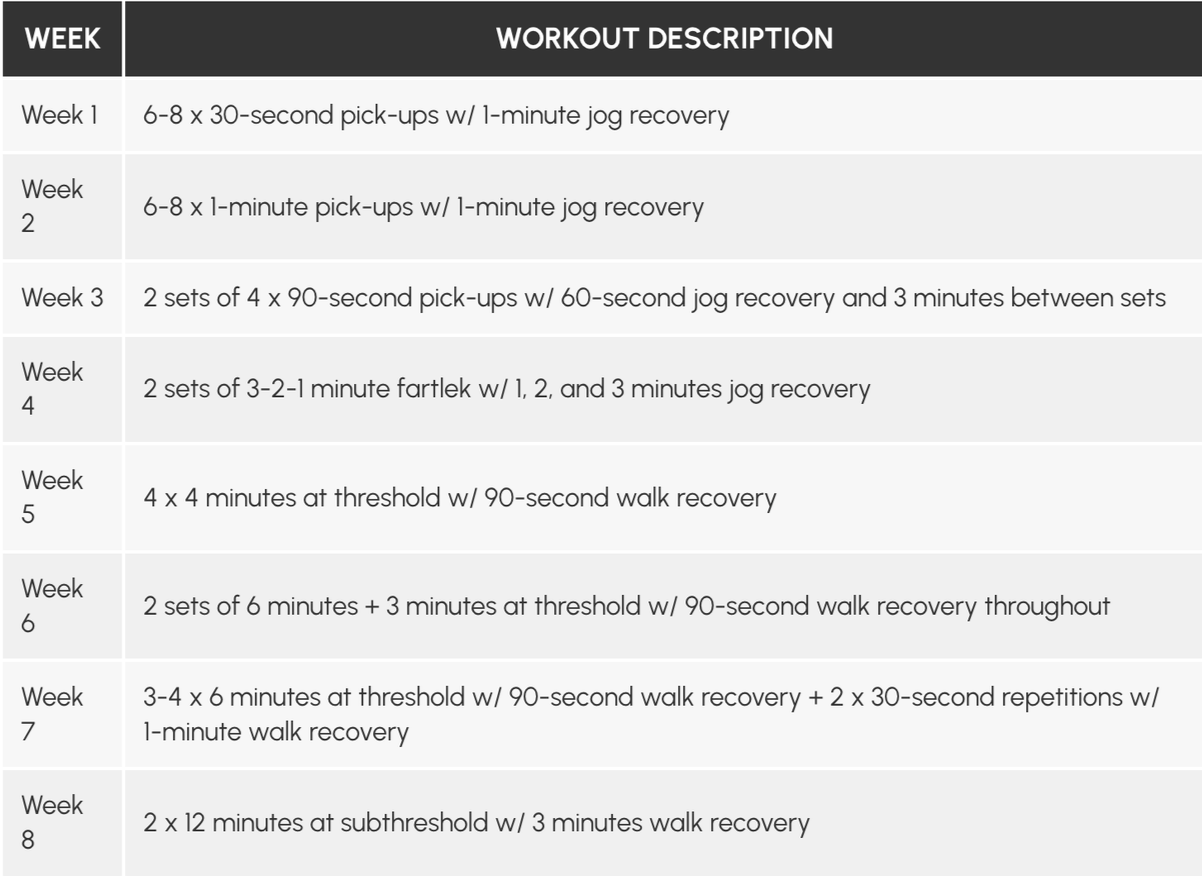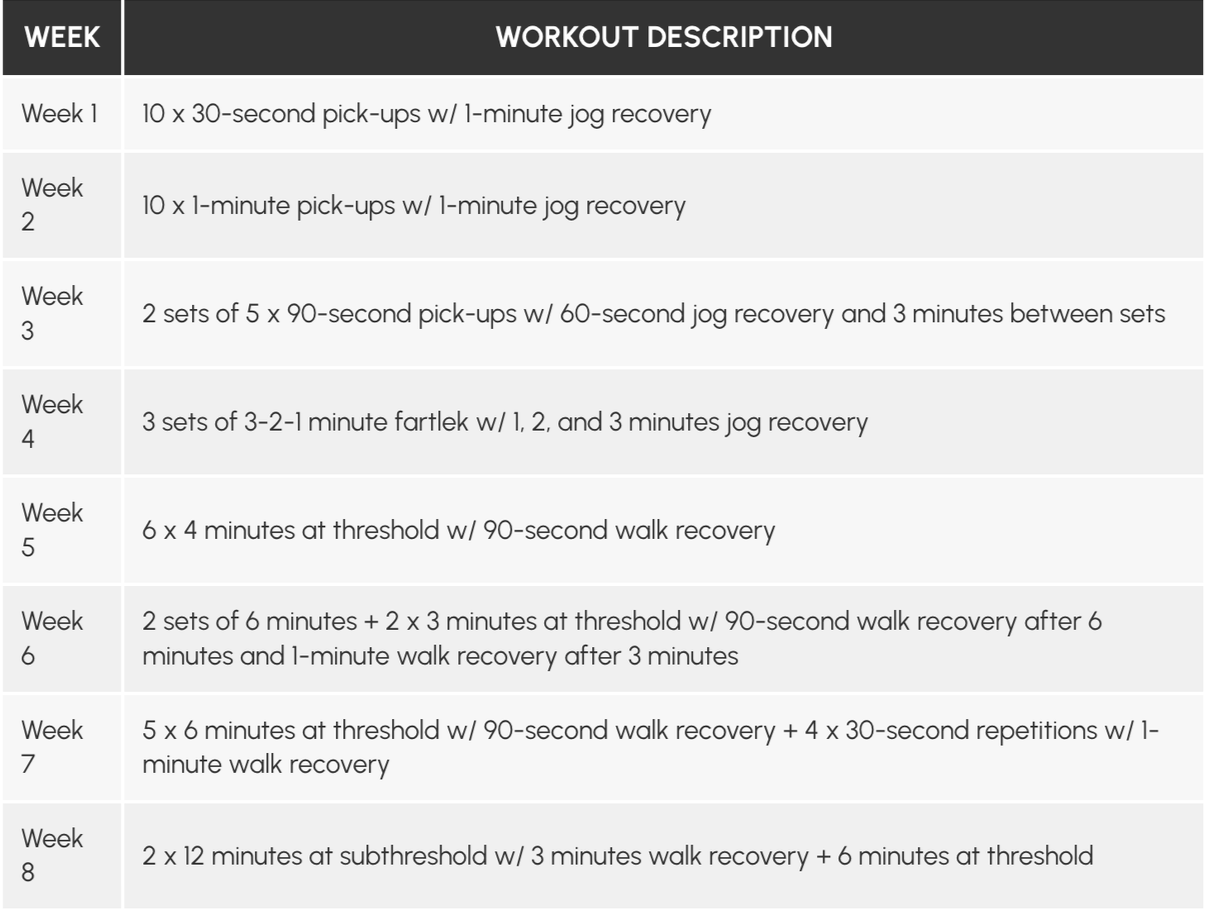8-Week Essential Workouts to Jumpstart Your Training for Any Race
Whether you're training for a mile or a marathon, foundational running workouts help build fitness, momentum, durability, and confidence
Let’s be honest. How many times have we started a training block for a 5-kilometer race and immediately jumped into 5 x 1K intervals at goal race pace? Best-case scenario, we complete the workout but still feel like, “There’s no way I can run my 5K at this pace!” The worst-case scenario? We overdo it too early in training and end up discouraged or sidelined for a few weeks or longer.
It’s so easy to want to skip foundational training and get straight to the “fun stuff”—the running workouts we hear about everyone else doing, knowing they work. They do work, but the big-hitter workouts become home runs when we build up to them by initially breaking them into bite-sized, effort-based pieces in the first few weeks of the training block. This process enables you to endure, enjoy, and experiment with what works early in training so you can expand your capacity to run faster and further during the longer, more pace-specific workouts later in your build.
As a former collegiate coach at Syracuse and Northern Arizona University, as well as a professional runner I noticed one of the main differences between collegiate and professional running is that the pros have a long period of base training where they focus on effort-based workouts like lighter pick-ups, hills, and fartleks before running long, sustained workouts at a specific pace—6x1mile for breakfast, anyone?
That steady build-up benefits everyone, from pros to total beginners. Whether I coach a weekend warrior or the first U.S. female at the 2024 London Marathon (Melissa Perlman, a unsponsored masters runner who ran a 2:44:57) I provide them with a similar eight-week workout progression that guides them from their unique, individual starting point to the specific workouts needed to achieve their goals.Follow the training progressions below for low, medium, and high mileage, as well as the training notes for each workout to enjoy the heck out of your training experience for any and every race.
When To Do These Workouts
Fit these weekly workouts into your training plan and make sure they are spaced out from any other “hard” efforts during the week (i.e. your long run). Begin the eight-week workout progression after at least two weeks of easy running. It can kick off your training build for a mile, 5K, 10K, half marathon, full marathon, and even an ultra. I know, I know, it sounds like, “How can this be?” I suggest you try it for yourself and share your experience with me.
How To Pace These Workouts
During the first four weeks of workouts, concentrate on your effort, form, starting conservatively, and building momentum throughout so you teach your body to finish faster than you start. If you find yourself fixated on pace, checking your watch every 20 seconds, or feeling overwhelmed, return to focusing on your form (see running form tips below), do a head-to-toe scan, and refocus on your effort.
Weeks 5-8 involve longer workouts to help you practice pacing. Even though pace is emphasized more in this block, it’s still beneficial to start off conservatively for the first few minutes of the first interval and then build momentum throughout the workout.
Always run paces that match your current fitness level. You can use the VDOT Calculator, based on Jack Daniels’ Running Formula to get a sense of what pace you should be running. If you’re consistent with your workouts, your fitness should improve every 4-6 weeks, so you can continue to update your pace throughout training. With this in mind, on week five you can reflect on how your workouts went the first four weeks and evaluate what paces make sense for you moving forward.
The Essential Workouts
The low, medium, and high-mileage workouts depend on a few factors:
Your weekly mileage.
Your running workout experience and how much mileage you typically run during them.
What race distance you’re training for.
Although many factors contribute to your ideal workout length, if you follow the mileage ranges below you likely will be matched with your ideal eight-week progression:
Low Mileage Workouts: Runners who average 5-20 miles per week
Medium Mileage Workouts: Runners who average 20-40 miles per week
High Mileage Workouts: Runners who average 40-60+ miles per week



